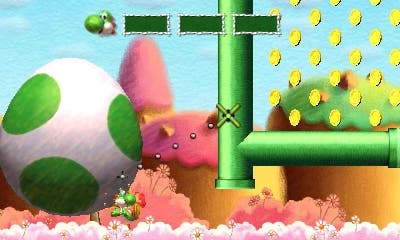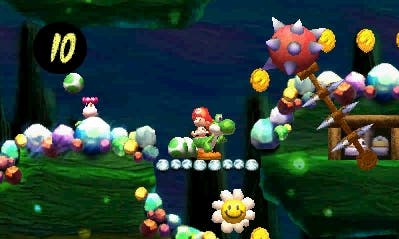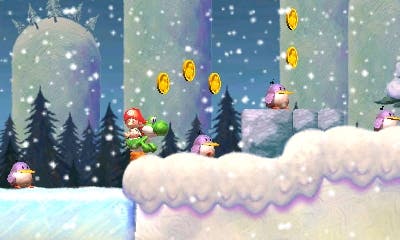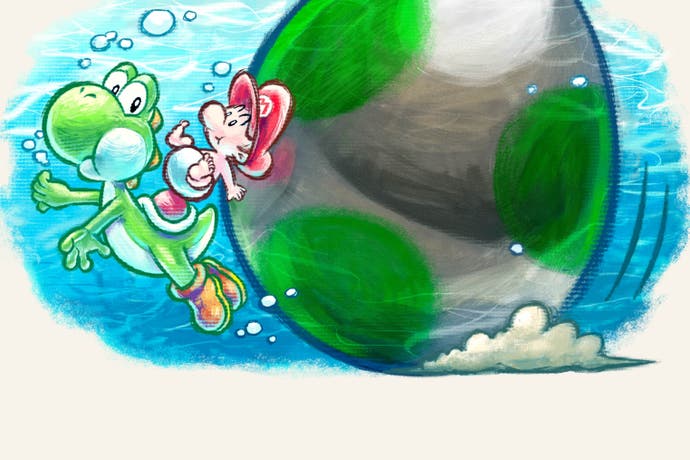Yoshi's New Island review
Dino crisis.
In light of Nintendo's recent travails, concern about its reliance on treasured brands is understandable. In these circumstances, it's worth thinking of the company not as a creator of games, but as a maker of premium toys. Viewed this way, the aim of its output is clear: its focus is not on past buyers, but on a new generation of players who won't mind that they're getting something similar to what their parents or older siblings played with.
Meanwhile, avid collectors remain enamoured with the company for the consistent quality of its product. The toys are ostensibly familiar yet subtly improved every time the line is refreshed; consider an action figure, hand-crafted to the same set of stringent design standards, but now using only the finest contemporary materials, with a greater level of detail and more points of articulation. In other words, it looks, sounds and moves better than ever before, and therein lies its maker's enduring appeal.
Problems with this approach only really arise when the the update isn't up to scratch. And it's immediately apparent that Yoshi's New Island has been outsourced to a manufacturer without the same level of quality control. To the untrained eye, it might not look like such a bad job, but those in the know can instantly tell it isn't the real deal.

It's a lesson in the importance of getting the fine details just right, because it's quite startling that a game so outwardly similar to the Super Nintendo original can be so very inferior. Initially, it's hard to pinpoint quite what developer Arzest - formed from the ashes of Artoon, the studio responsible for Yoshi's Universal Gravitation and FlingSmash - has done wrong.
After all, many of the same ingredients remain. The story is all but a straight retread, with different-coloured members of the Yoshi clan transporting proto-Mario to reunite him with his kidnapped brother. Each level holds the same collectables - five flowers, 20 red coins, 30 small stars - and many of the same enemies. You'll still gobble up Shy Guys and Crazee Dayzees, excreting them as eggs that can be thrown at coins, switches and other enemies. The action is broken up by occasional vehicle sections that see Yoshi transform into a balloon, a helicopter or a bobsled. In many respects, little has changed.
And at the same time, so much has. The SNES game had an art style that felt unique at the time, a delightful hand-drawn aesthetic with character and charm to spare. Yoshi's New Island opts for a similarly homespun look, using pastels, oils, watercolours and inks in both its background and foreground scenery, while the 3D slider offers some neat depth-of-field effects. It's not flat in a physical sense, then, but it's lifeless. It's inconsistent, too: Yoshi and several of his opponents have a pre-rendered look akin to the N64's disappointing Yoshi's Story. It may be a practical choice to ensure they stand out against the colourful scenery even with the 3D effect switched off, yet the result is ugly and looks unusually cheap for a Nintendo-published game.
It's startling that a game so outwardly similar to the Super Nintendo original can be so very inferior

If the art is divisive, however, it's likely there will be greater consensus on the way it sounds. It seems Kazumi Totaka reserved all his best tunes for Animal Crossing: New Leaf, because his soundtrack is bewilderingly poor, with a series of feeble variations on a lacklustre main theme and several duff jingles. Some deliberately off-key moments are presumably meant to lend the music a rough-edged charm, but only succeed in provoking irritation. The aim is to evoke a bedtime story, but it merely feels lethargic. Where's the bounce, the energy of Koji Kondo's wonderful athletic theme?
If the music has something of a soporific effect, it finds a match in the sedative qualities of the level design. The original wasn't the paciest of platformers, but it was never as languid as this. The sluggishness seems to infect Yoshi, who waddles along as if constipated, while his flutter-jump seems more strained than ever as he labours for that extra airtime. There's seldom any sense of peril in the platforming - for the most part, falling down simply means finding a route back from where you dropped, while enemies aren't a threat so much as an irritant, positioned for maximum inconvenience. Towards the end you'll be chased and harassed by larger foes, but these dangers are too infrequent and arrive too late. The boss battles, meanwhile, are insultingly easy - most are simply larger versions of existing enemies, and all perish within three strikes.
Rarely has one word in a game's title felt quite so redundant, because there's very little that qualifies as 'new' here. Occasionally you'll happen across a large pipe which holds a giant Shy Guy, prompting a brief bout of button-mashing as Yoshi struggles to swallow it down - and the logistics of what follows don't bear thinking about. These enormous eggs can be rolled into scenery to demolish it and earn you extra lives, but they're used prescriptively and predictably.

The heavier metal eggs, obtained by swallowing a silver Shy Guy (whose pencil-shaded design is the best visual effect in the game) are used a little more creatively, as they're the only way to sink in a body of water. Negotiating a path through these pools to hidden flowers and coins is as thoughtful as the environmental puzzling gets - but as new features go, the sporadic use of large eggs is hardly an innovation for the ages.
Next to the upcoming Kirby Triple Deluxe, a similarly slow-paced and challenge-light platformer, Arzest's effort falls embarrassingly short, lacking the vibrancy, spirit and generosity of HAL's game. Most gallingly of all, it seems Nintendo saw this coming: aware of the murmurings of discontent that accompanied the game's initial reveal, the company took pains to announce that original producer Takashi Tezuka would be overseeing the latter stages of development, which always felt like an unconvincing attempt to placate worried fans.
It might look a little like Yoshi's Island, then, but it's a worse game in every regard. 19 years on from the original, its design has been denuded of almost everything that made it great: a series once fecund with ideas is now coasting on past glories. Yoshi, one of Nintendo's most selfless heroes, deserves far better - and may get it later this year, if Good-Feel can spin yarn into gold on Wii U. But on a console that has recently hosted more than one unlikely comeback, Yoshi's New Island is the slightest return so far. If it were a toy, you'd make sure you kept the receipt.

